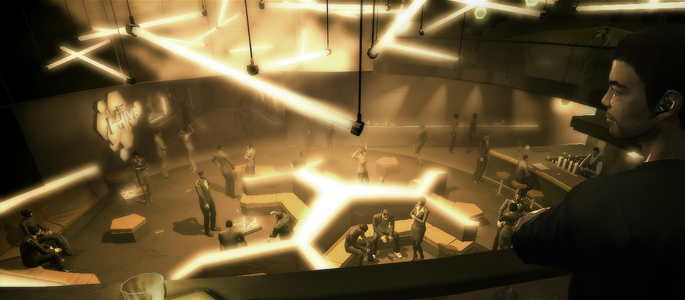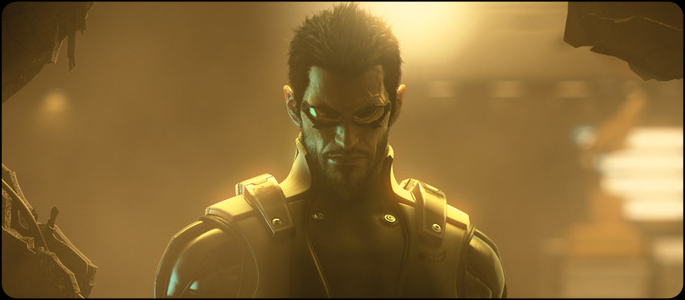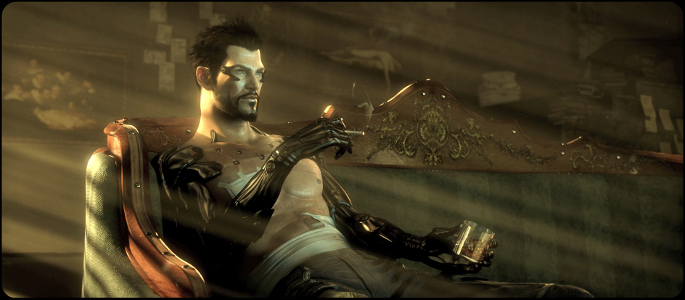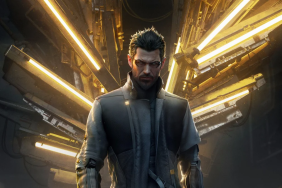The Deus Ex series has a long, storied history. The first title burst onto the gaming scene, and broke genres with a, then unheard-of, melding of first person shooter and RPG. This was followed up by the fan-splitting Invisible War, which, while still well-received, did not live up to its predecessor’s legacy. Eidos Montreal has been tasked with bringing the series back to relevancy with Deus Ex: Human Revolution, but have they succeeded in such a gargantuan task? Let’s find out.
Deus Ex: Human Revolution takes place in 2027, which is only a short 16 years from the present day. Playing as security officer Adam Jensen, you are granted nearly superhuman-like abilities in the form of augmentations. Not only are these augmentations useful, but they also saved your life when a group of black-ops commandos from an unknown entity swooped in and decimated the biotechnology company you were hired to protect. You are single-handedly tasked with the job of uncovering who attacked you, and why. The story really stands out in Human Revolution, but that is not the only thing that is well fleshed-out.
Human Revolution was made for multiple playthroughs. It is impossible to obtain all the Praxis points necessary to upgrade all your augmentations fully, so you have to decide ahead of time how you will play the game. Will you toughen up Jensen so you can play commando in every scenario? Or will you beef up your hacking and stealth capabilities in order to get in, get what you came to find, and get out without so much as a squeak? This is where the game really opens up, and it seems the developers took to great pains to ensure every mission can be played in any play style.
However, twitch shooter fans should be cautioned here. Although the game is a first-person shooter, it is first and foremost a tactical shooter. Running into a firefight and not using cover will get you killed before you can finish reading this sentence. Jensen is augmented, but that can only take you so far. Drinking beverages and taking painkillers can increase your health to 200, but it will deplete in only a few gunshots to Adam. When you go for a kill, you have to ensure that you know the area around your enemy. If you use an unsilenced weapon, it will attract attention. This can get tough when you are going into a patrolled area and have no knowledge of the premises. Let’s not also forget that ammo is pretty scarce for the larger weapons. Upgrading your pistol is highly recommended. Still, although combat is tough, clearing an area of enemies without them knowing where you are shooting is very rewarding.

Which leads me to one of my few criticisms with the game – its AI. No matter the difficulty level, your enemies seem to have incredible accuracy at any range. When you peek out from your cover to take a shot, you better have that crosshair pinned on the enemy you are trying to take down, or else you have a fraction of a second before you get shot. Enemies also seem to have incredible vision. I’ve been spotted a level below, through a small window, in a dark room! However, these particular bad guys apparently have the attention span of a mouse. I can kill a guard opposite another in a hallway, and then go find a vent. All the other enemy will say is “what happened?” He will scan the area for a minute or so, and then go back to his regular patrol. When in combat, if the AI sees me down a hall, they will simply funnel down and be easy pickings as the game almost turns into a shooting gallery. Despite this, there is the occasional firefight that has me quickly surrounded by enemies on all sides and I either have to run out of the area or face certain doom. It just feels a bit inconsistent. Boss battles – the physical ones anyway – also feel incredibly tough. Even the first battle is frustratingly tough, until you realize that the environment helps you out more than the available firepower. I’d go into more depth, but this sort of thing feels like something you need to figure out on your own.
Every location that you visit is incredibly detailed. The entire world of 2027 seems believable. When entering the Detroit PD building, for example, dust can be seen highlighted by the rays of light entering the windows. It feels just like a scene out of the classic Blade Runner film, which is itself a near-future sci-fi movie. Outside, the city teems with life. Ugly, dirty life, but life nonetheless. You see street bums, police officers and business people walking around the city, some of whom you can talk to and start a side mission or obtain some information about the city. Asking the right questions can get you some hints pertaining to the job at hand, while saying the wrong thing will get you a cold shoulder. Every single NPC is voiced – they all seem to have at least two different things to say to you. A few characters are re-used, but unless you are going around and talking to all the NPCs within a short span of time you will hardly notice. Voice acting is about on par with most NPCs, and the main characters are given a bit more life to them.
Speaking of audio, the soundtrack is very reactive, and builds up during the ebb and flow of combat. Whenever you alert a nearby enemy, you know it right away via the soundtrack, and when you are undetected, audiovisual clues are there to let you know. Outside of combat, there is a television network that plays almost everywhere in whatever city you currently find yourself, which often reflects on actions that you had taken previously. In the seedier sections of cities, you can hear dogs barking, people eating and conversing, and, more harrowingly, the muffled screams of a helpless woman. Reloading and shooting weapons sounds authentic, and everything is presented in wonderful 7.1 surround sound.

Graphically, Human Revolution doesn’t disappoint. Yet it also doesn’t really impress. The world of Human Revolution does have a lot of cool, shiny, futuristic things to look at, but perhaps best admired from afar. Up close, things are kind of blurry and, with games such as L.A. Noire out there, the facial animations seem dated. But overall, the black and gold color scheme works for the game, and everything from televisions to refrigerators feel like they belong in the world. Newspapers are not too far removed from today’s tablets, and cell phones that NPCs use look like a few concept devices we have seen in today’s world. You can tell the game has had a lengthy development period, but the quality level is consistent, unlike a certain other game that took years to produce.
Without diving into it, the story in Deus Ex: Human Revolution is incredibly crafted. This is the kind of game that feels like you are playing a movie. There’s conspiracy, politics, violence, and even a little bit of romance. It’s intense, violent, and rife with social commentary. The basic premise of a desire to find out why you were attacked is easy to follow, yet there are deeper meanings to some aspects of the story. Although the game gives you many choices as to how you play the game, these decisions only seem to affect the story in small ways. The overall plot doesn’t change a whole lot despite your actions. The adventure is a fun ride, however, so you won’t notice that your choices are not as heavily-weighted as you think until you’ve played the game a few times.
So, does Deus Ex: Human Revolution revive the franchise that fell out of grace with Invisible War? Hell yes. This is really the pinnacle of a customizable shooter. Every level has multiple paths that you can take, each tailored to a specific play style. Combat is tough, and every battle is won, not through sheer reaction time, but rather through cunning tactical moves. The story moves along at a wonderful pace, with characters you grow to care about. Sure, the AI has some issues, and you’ll wish you had more ammo for your larger weapons, but it all comes together to breathe some fresh air into the FPS genre. Fans of the series will not be disappointed, and new players will definitely enjoy what they play. Eidos Montreal has crafted a lengthy, entertaining, genre-crossing adventure, one that just begs for multiple playthroughs – something which fewer and fewer games can tout these days.
PlayStation LifeStyle’s Final Score
+ Satisfying tactical combat, multiple ways to complete every single mission. – Inconsistent AI, individual choices not as far-reaching as it would seem. |
 |








